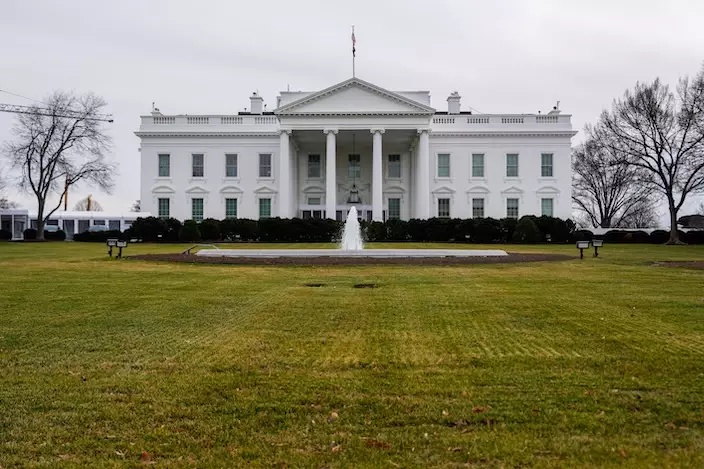While Trump has loudly imposed so-called "reciprocal tariffs" globally, repeatedly targeting China with increased rates, he has also been "flip-flopping," exempting electronic products like smartphones and computers. On April 13, the British Financial Times published an article titled "China is well positioned to weather Trump's trade war," analyzing from three perspectives why Trump's tariff policy is "doomed to fail."
The article was written by Arthur Kroeber, founding partner and head of research at Gavekal Dragonomics.
The article notes that Trump has imposed at least a 10% tariff on almost all imports to the US, with steel, aluminum, and cars facing 25% duties, while China has been hit with a 145% tariff. Trump's team is scrambling to rationalize the chaos of tariff policies as a master plan to build a coalition to defeat China, but any such plan is doomed to fail.
First, the article points out that Trump frequently claims his tariffs aim to "crack down on unfair trade practices, eliminate trade deficits, reindustrialize America, and confront China," but these stated aims often contradict each other, negate other policies, or are obviously unachievable.
The article suggests that a better explanation is that Trump is "motivated mainly by a desire to accumulate and exercise power, and tariffs are the best instrument of that power." The purpose of his general trade war is to remove constraints imposed by the global economic order on the unilateral exercise of US power, particularly presidential power.
The article explains that Trump has believed for decades that "the rest of the world will pay any price to gain access to the US market." Perhaps more importantly, until Congress chooses to stop him, Trump has "unlimited personal authority to impose (or withdraw) tariffs on any country, at any time, for any reason." What Trump wants above all is to "display dominance and extract submission." Countries that did not actively resist his tariffs were graciously granted reprieves from higher rates, while the country that dared to defy him was savagely punished.
Therefore, the article argues that most countries now understand that the various economic rationales offered by Trump's advisers are just "window-dressing." While Trump is in charge, the US is unreliable, and no sane leader will join him in a crusade against China.
The second reason why the US-China trade war is "doomed to fail" has become clear in last week's massive sell-off of US Treasury bonds. It caused Trump to retreat on the "reciprocal tariff" issue. This shows that the bond market determines the size of his tariff stick, which is much smaller than he thought. As a result, Trump has lost leverage in trade negotiations because adverse market reactions prevent him from raising tariffs again, as the Treasury market would revolt again.
Kroeber predicts that for most global leaders, the strategy will be to cut quick deals where tariffs are lowered in exchange for cosmetic concessions and tokens of deference. “And these deals will not include promises to blow up their trading relations with China.”
The third reason why the China trade war is "doomed to fail" is China itself. The article notes that at first glance, China seems worse off than the US, having lost access to one of its biggest export markets and appearing diplomatically isolated. In fact, China is "well prepared to fight a war of economic attrition against the US."
Facing potential loss of US exports, China can replace this with domestic consumer demand. The article states that Xi Jinping "has reversed course and is now serious about boosting domestic demand."
Additionally, experience has shown that "China can also get along fine without imports from the US." The article notes that "five years of export controls have helped it get very good at making things without American technology." Regarding market concerns about yuan depreciation, the article believes that if China can implement convincing demand stimulus measures, this will attract capital inflows and support the exchange rate.
The article also points out that due to tariffs on Chinese consumer goods, the US faces higher inflation, as its "reliance on Chinese industrial inputs is three times that of China's reliance on US components." Price increases are already hurting business investment.
John Williams, President of the Federal Reserve Bank of New York, recently stated that under Trump's tariff policy, US economic growth is expected to fall below 1% this year, with inflation rising to between 3.5% and 4%, and unemployment rising to 5%.
The Kroeber article concludes that China has a demand problem that it can solve with better macro policy, while the US faces a supply shock and possible stagflation, which can only be solved by economic regime change. In other words, if the aim of Trump's new trade war with China is to get Beijing to bend the knee before US power, the result will only be frustration and disappointment.
Deep Throat
** The blog article is the sole responsibility of the author and does not represent the position of our company. **
Trump wasted not one second after US forces grabbed Venezuelan President Nicolás Maduro. He made it clear that he was eyeing the country's oil riches. But here's the catch: America's biggest oil companies aren't biting. Industry analysts confirm what the companies won't say publicly—even if these firms wanted back in, Venezuela's crumbling infrastructure and chaos on the ground mean Trump's fantasy of quick oil profits is far from easy to come true.

Trump promises Big Oil will pour billions into Venezuela. The oil giants say they never got the memo. AP Photo
Minutes after the military operation wrapped, Trump stood at a press conference making promises. Major American oil companies would pour into Venezuela, he declared, investing billions to fix the country's shattered oil infrastructure "and start making money for the country". Meanwhile, he reiterated that the US embargo on all Venezuelan oil remains in full effect.
Those sanctions have crushed Venezuelan exports into paralysis. Documents from Venezuela's state oil company and sources close to the situation confirm storage tanks and floating facilities filled up fast over recent weeks. Multiple oil fields now face forced production cuts.
White House Courts Reluctant Executives
Reuters revealed the Trump administration plans meetings this week with executives from major US oil companies. The agenda: pushing these firms to restore and grow oil production in Venezuela following the military action. The White House sees this as a critical step toward getting American oil giants back into the country to tap the world's largest proven oil reserves.
But Trump's eagerness hasn't translated into corporate enthusiasm. Several major US oil companies are taking a wait-and-see approach, watching Venezuela closely. ExxonMobil, ConocoPhillips, and Chevron all denied any prior communication with the White House about Venezuela. This directly contradicts Trump's claim over the weekend that he had already met with "all" US oil firms both before and after Maduro's capture.
Venezuela sits on roughly 17% of the world's proven oil reserves—first place globally. Yet US sanctions and other pressures have gutted its production capacity. Current output runs around 1 million barrels daily, barely 0.8% of global crude production.

World's largest oil reserves, strangled by US sanctions. Trump's quick-profit scheme hits a hard reality. AP Photo
Only One Company Stays Put
Chevron remains the sole major US oil company still operating Venezuelan fields. The firm has worked in Venezuela for over a century, producing heavy crude that feeds refineries along the Gulf Coast and beyond. A company spokesperson said on the 3rd that the current priority centers on "ensuring employee safety, well-being, and asset integrity," adding they "will continue to operate in accordance with laws and regulations."
ExxonMobil and ConocoPhillips previously invested in Venezuela. In the 1970s, the Venezuelan government nationalized the oil industry, reopened to foreign investment by century's end, then demanded in 2007 that Western companies developing oil fields form joint ventures with Venezuelan firms under Venezuelan control. ExxonMobil and ConocoPhillips pulled out. Neither company has responded to Trump's latest remarks about US capital entering Venezuela.
One oil industry executive told Reuters that companies fear discussing potential Venezuelan business at White House-organized meetings due to antitrust concerns.
Benefits Flow to First Mover
Francisco Monaldi, director of the Latin America Energy Program at Rice University's Baker Institute for Public Policy, expects Chevron would likely benefit first if Venezuela opens oil projects to the US. Other oil companies, he notes, will watch Venezuela's political situation closely and observe the operating environment and contract compliance before making moves.
Mark Christian, business director at an Oklahoma energy consulting firm, lays out the baseline: US companies will only return to Venezuela if they're certain of investment returns and receive at least minimal security guarantees. Lifting sanctions on Venezuela stands as a prerequisite for US companies re-entering that market.
Reality Check on Oil Profits
Even with sanctions lifted, the Trump administration won't find making money from invasion-acquired oil that easy.
Industry insiders admit large-scale restoration of Venezuelan oil production demands years of time and billions in investment, while confronting major obstacles: dilapidated infrastructure, uncertain political prospects, legal risks, and long-term US policy uncertainty.
Peter McNally, global head of industry analysis at Third Bridge, said, "There are still many questions that need to be answered about the state of the Venezuelan oil industry, but it is clear that it will take tens of billions of dollars to turn that industry around." He then added that it could take at least a decade of Western oil majors committing to the country.
Ed Hirs, an energy expert at the University of Houston, pointed to a pattern: US military invasions of other countries in recent years haven't delivered substantial returns to American companies. The history of Iraq and Libya may repeat itself in Venezuela.










